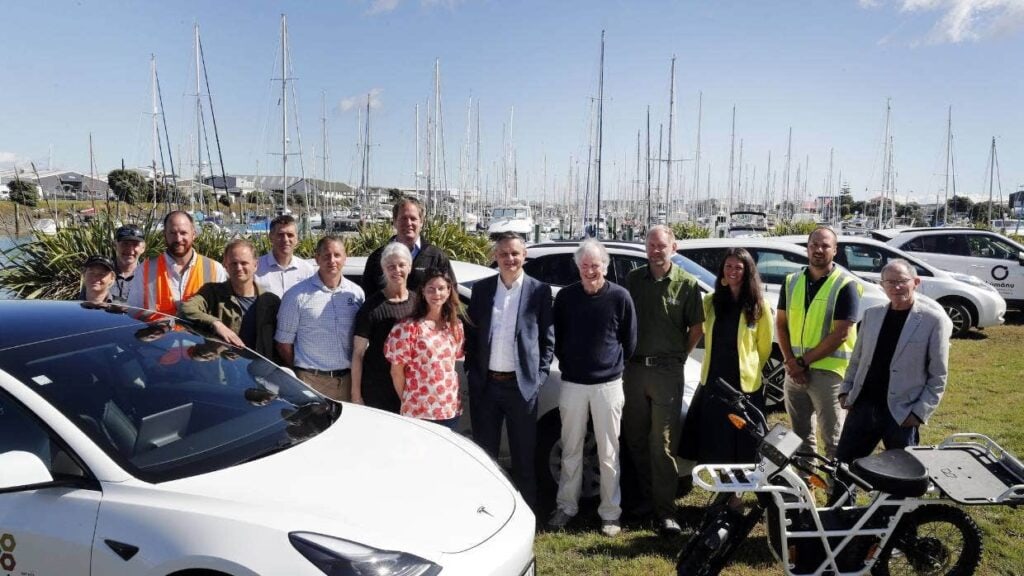Nelmac Kūmānu have been making great headway to reduce their organisation’s fuel consumption and we can learn a lot from their experience. We approached their former Environmental Management Leader, Rachael Williams-Gaul, for some insights.
Tasked with the goal to reduce Nelmac Kūmānu’s carbon emissions by 25% by 2025 (relative to revenue), in line with its commitment to protect, renew and enhance the environment, Rachael embarked on what would end up being a three and a half-year journey into fleet management that saw great results.
Reducing your fuel consumption in business can have a huge impact on your overall carbon footprint.
Key takeouts:
Transition your fleet and infrastructure
- Introduce an electric first approach
- Replace older vehicles with EVs (preferably) or more fuel efficient ICEs
- Downsize unnecessarily large vehicles
- Ensure convenient EV charging –onsite and/or via reimbursement for home charging
Change behaviours
- Monitor speeding and idling behaviour
- Encourage sustainable commuting
- Reward good practice through competitions and prizes
- Identify champions and promote/communicate positive change
Reduce fuel use in your operations
- Improve planning and infrastructure to reduce or avoid short trips
- Encourage carpooling wherever possible
- Move staff from utes to EV and hybrid passenger vehicles where not required as a tool of trade
Where did you start at Nelmac Kūmānu?
We started by understanding our carbon footprint and where the core of our emissions were coming from. We identified that 95% of our emissions were coming from fuel.
What did you do to reduce your carbon emissions?
We focused on four key areas, looking at transitioning to electric vehicles (EVs); replacing old fleet with new, more fuel efficient fleet; improving driver behaviour; and introducing operational efficiencies to reduce our fuel consumption
“We focused our approach on four key areas…”
How did you approach fleet transition?
We adopted an electric first approach, so that when fleet are being replaced we first consider an electric or hybrid vehicle.
We have also been replacing our older vehicles with more modern, fuel efficient ones, with the aim being to have a five-year replacement plan for most of our fleet. Almost all of our managers have moved from utes to driving electric or hybrid cars. The water team replaced a large bottle truck with a specially customised, more fuel-efficient ute.
For the EVs we needed to make charging more convenient. We installed EV chargers at our main site and introduced a reimbursement scheme for staff who were charging EVs at home.
“We brought in an electric first approach for purchasing new fleet, introduced EV charging infrastructure, and replaced older vehicles with more modern, fuel efficient ones.”
What operational changes did you make?
We identified some opportunities to avoid unnecessary travel, such as changing fuel provider to one that had fuel stations closer to our sites.
We also encourage staff to carpool wherever possible and brought a minivan into the mix for one of our teams to get to site, rather than travelling in separate vehicles.
“We identified some opportunities to avoid unnecessary travel…”
What did you do to change driver behaviour?
We installed GPS tracking with ‘Smartrak’ to monitor speeding and idling, as these factors can use up quite a lot of unnecessary fuel.
We regularly communicate to our teams about improving driver behaviour aimed at fuel reductions and ran a quarterly ‘Smooth Operator’ competition to reward the department with the best driving.
A three-month ‘Sustainable Commute’ initiative encouraged staff to bike, walk or carpool to and from work. They were rewarded with a Prezzy Card of up to $150, based on the number of trips achieved.
“We installed a ‘Smartrak’ system to monitor speed and idling and rewarded behavioural change…”
What were some of the results from these activities?
It has taken a while, but the interest and uptake from staff toward electric and hybrid vehicles is growing, which is really positive.
Across the business our emissions relative to revenue have been reducing and the business is on track to meet our 2025 target.
The biggest impact will be when electric and hybrid truck and Ute options become more available. Nelmac Kūmānu has a hybrid Hino truck on order which is anticipated to be 30% more fuel efficient, which is quite exciting.
“After a period of 12 months we started to see a downward trend in emissions relative to revenue across the business.”
What have been the challenges?
It has been a real challenge trying to get staff to buy into EVs. A lot of them have worked with ICEs their whole life so, paired with extreme marketing to maintain loyalty to utes and SUVs, it has been a real culture shift.
However, Nelmac Kūmānu’s main challenge is that most of its fleet are trucks and utes which cannot be easily replaced with electric and hybrid options, like passenger vehicles.
Underpinning all this has been the need to build knowledge, particularly around setting up infrastructure to support EV use. At the beginning we had challenges to set up EV charging at our main site due to the capacity of our switch board. It’s all new and we are learning all the time.
Challenges: Staff buy in | EV availability | Knowledge | Infrastructure limitations
What helped?
We were very lucky to have our Board and CEO on board from the start, it made a huge difference.
We also have a really committed sustainability committee of 10-12 people who actively support this work, and we have been able to identify champions to lead by example within the business.
Connecting with others outside of Nelmac Kūmānu through Mission Zero’s Fleet Management Group has also really helped. They were able to share a lot of insights into their experience of sustainable fleet management which I could learn from.
Progress was assisted by: Board and CEO buy in | A committed sustainability committee | Internal champions | External support network
What are your key project management tips?
Data is key. Identify champions. Collaborate with others. And be passionate.
It’s a journey, with its high in lows.
Just get going.
Project tips: Data is key | Identify champions | Collaborate with others | Be passionate
Thank you to Rachael Williams-Gaul for her contribution to this article and her work as Mission Zero’s Fleet Management Leader and to Nelmac Kūmānu for supporting her in this.



